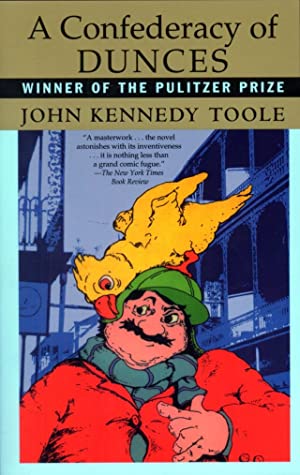- The Good: Hyperbolic; Satirical; a lambast of the middle class
- The Bad: An overly obnoxious protagonist whose cringe-worthy antics might not be funny to everyone
- The Literary: Surprisingly accessible Pulitzer prize winner
The larger-than-life Ignatius J. Reilly hopes to compile his magnum opus one day, but for now he writes his loathings of modern society on his Big Chief writing pads, spread haphazardly around his room and under his bed. The 30-year-old college graduate, obese slob, and self-proclaimed medievalist lives at home with his lush mother Irene in New Orleans. But his quiet life is upended when a run in with an overeager cop and a car accident send Ignatius out into the world in search of a job.
The problem is Ignatius is not the sort that does well in modern middle class society, and he knows it. You see, he has a special valve. The pyloric valve, which closes abruptly, usually from stress, stifling his genius, and physically debilitating him. He would prefer to spend his time playing his lute, frequenting movie theaters to yell at the atrocities on screen, and writing letters to his frenemy from college, a liberal feminist beatnik named Myrna Minkoff.
As Ignatius moves from low wage job to low wage job, a wide cast of characters is revealed. Numerous subplots emerge, but have no fear; they all come together surprisingly well in the end. Just when you might want a break from the selfish and domineering antics of Ignatius, another character full of hyperbole, both in characterization and dialect, enters the stage. No one is safe from satire in this dark comedy. My favorites are the well-meaning stripper Darlene and her cockatoo, looking for their big break; the senile septuagenarian secretary Miss Trixie, who just wants to retire; and the weak company owner Gus Levy, object of derision by his wife.
It’s a little difficult to read some of the portrayals with modern eyes, particularly of Dorian Greene, a flamboyant French Quarter homosexual who throws elaborate parties, and especially Burma Jones, a black janitor who holds on to his low paying job only to avoid being arrested for vagrancy. Everyone is a caricature, not just these two, but that doesn’t mean it’s not a little uncomfortable to hear Burma equating his condition to picking cotton.
Speaking of modern books, it’s rare to see dialects in prose, mostly because of they are easy to get wrong and even when they’re accurate they can be offensive. However, it does help root this story even more in it’s strong sense of place and time. New Orleans is practically a character unto itself. Written in 1963, the novel was published posthumously in 1980 after the author’s suicide.
It’s very rare to find a book with a unlikable protagonist that works. Ignatius is eccentric and idealistic, but he’s also trapped in the delusions of his own grandeur. He blames his misfortune on the gods, looks down on everyone around him, verbally berates his mother, lies constantly, and belches and farts in public or not. He’s memorably monolithic. A bombastic buffoon. He’s terrible. So is everyone else in this book. But I just can’t look away.
A Confederacy of Dunces is a Pulitzer Prize winner and considered to be one of the great American novels of the twentieth century. I highly recommend this for any keen reader of Americana or for those who feel they don’t quite fit into the mold of the modern middle class!
“That is a lute, not a banjo,” Ignatius thundered. “Does she think that I’m one of those perverse Mark Twain characters?”
